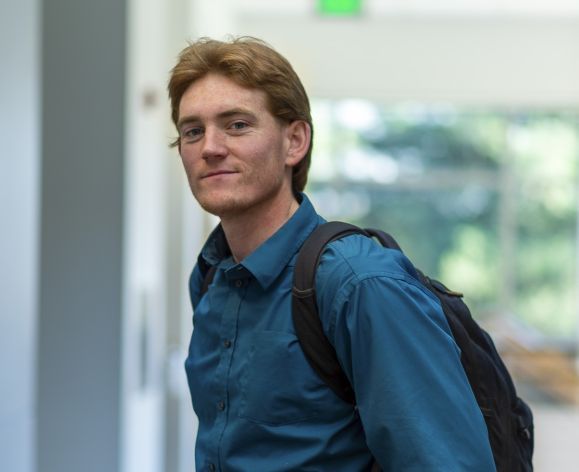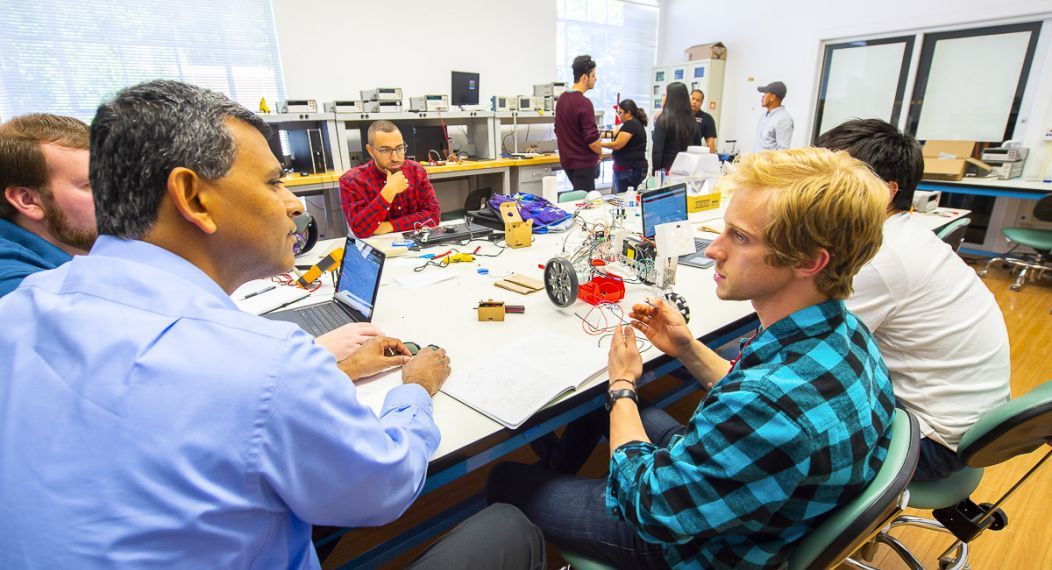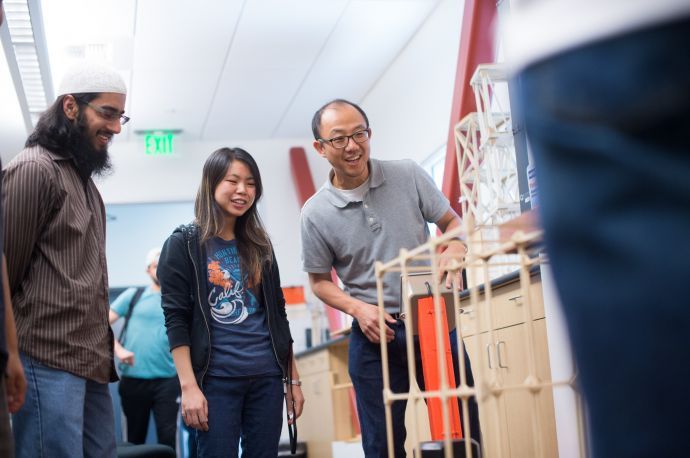The Master of Science in Engineering (MSE) at Pacific is designed to strengthen students' technical, analytical and professional breadth and depth. All students receiving an MSE degree will complete a set of core courses that covers the broader subjects of research and analysis.
Traditional Program
The Master of Science in Engineering (MSE) program is designed to strengthen students' technical, analytical, and professional breadth and depth. All students receiving an MSE degree will complete a set of core courses that covers the broader subjects of research and analysis. Students are allowed admission to the MSE program after completing their bachelor's degree. Traditional MSE students may qualify for a graduate assistantship, which provides tuition and a living stipend.
Choose Your Concentration
- Civil Engineering (Environmental and Structural)
- Computer Engineering, Electrical Engineering
- Mechanical Engineering
- Engineering Management

“The small class sizes were one of the things that liked about Pacific. I transferred here from a community college over in Pittsburgh, near Antioch, CA. So, I really appreciated the small classes and really getting to know your professor. And one of the things I found out here is that your professor is a lot of times your advisor which actually makes a big difference because professors know the ins and outs and what courses are actually needed before you can take other courses.”
Undergraduate courses MSE students must have completed prior to or during their MSE studies for the given concentration. Download a pdf version of these prerequisites (pdf).
Students interested in Computer Science
- Data Structures (COMP 53)
- One semester of calculus
- Statistics
- Discrete Mathematics (COMP 47)
- Algorithms (COMP 157)
- Computing Theory (COMP 147)
- Operating Systems (COMP 173)
- Programming Languages (COMP 141)
Students interested in Structural Engineering
- Calculus III (MATH 55)
- Computer Programming (ENGR 19)
- ODE (MATH 57)
- Physics (PHYS 53)
- Statics (ENGR 20)
- Mechanics of Materials (ENGR 121)
- Introduction to Structural Engineering (CIVL 100)
Students interested in Electrical Engineering
- Calculus III (MATH 55)
- ODE (MATH 57)
- Data Structures (COMP 053)
- Electric Circuits (ECPE 041/041L)
- Digital Design (ECPE 071/071L)
- Systems Analysis (ECPE 121)
- Electronics (ECPE 131/131L)
- Physics II (PHYS 55)
Students interested in Environmental Engineering
- Calculus III (MATH 55)
- Chemistry (CHEM 24)
- Computer Programming (ENGR 19)
- ODE (MATH 57)
- Statics (ENGR 20)
- Fluid Mechanics I/L (CIVL 130/L)
- Intro to Environmental Engineering (CIVL 132)
Students interested in Computer Engineering
- Calculus III (MATH 55)
- ODE (MATH 57)
- Discrete Math for Computer Science (COMP 047)
- Data Structures (COMP 053)
- Electric Circuits (ECPE 041/041L)
- Digital Design (ECPE 071/071L)
- Systems Analysis (ECPE 121)
- Microcontrollers (ECPE 172)
Students interested in Mechanical Engineering
- Calculus III (MATH 55)
- ODE (MATH 57)
- Mech. Engr. Graphics (MECH 015)
- Electric Circuits (ECPE 041/041L)
- Computer Programming (ENGR 19)
- Statics (ENGR 20)
- Materials Science (ENGR 45)
- Instrumentation (ENGR 110)
- Dynamics (ENGR 120)
- Mechanics of Materials (ENGR 121)
- Thermodynamics (ENGR 122)
Students interested in Engineering Management
- Three semesters math (incl Calculus II MATH 53)
- Prob & Statistics (MATH 37 or MATH 39)
- Computer Programming (ENGR 19 or COMP 51)
- Project Decision Making (EMGT 170)
Graduates of the Master of Science in Engineering (MSE) degree program will be prepared to demonstrate:
- A broad understanding of problem-solving, design, and research skills necessary to operate in the interdisciplinary arena of engineering and computer science
- Sufficient depth in an area to be able to design complex systems or pursue a more advanced degree
- Skills necessary to engage in lifelong careers as practicing professional engineers or computer scientists
Students may complete the requirements for the MSE program following one of two degree plans: thesis or non-thesis plans, each requiring a minimum number of 30 units. The thesis plan will require students to perform independent research and will culminate in the completion of a thesis based on the findings of the research. The thesis plan is intended for students who plan to pursue a career in research or a PhD.
Students may complete the requirements for the MSE program following one of two degree plans: thesis or non-thesis plans, each requiring a minimum number of 30 units.
The non-thesis plan requirements may be completed following one of two options:
- Project: Primarily intended for students concurrently employed. MSE students who are concurrently employed in a technical capacity may work with their faculty advisor and worksite supervisor to develop a proposal for a worksite project. The project should be complementary to their MSE curricular plans. It will presumably be a project which is of value to their employer. The assumption is that the student/employee will do this project as a part of their regular employment, receiving normal pay; but this is not required by the university. Upon completion of the project, the student will submit a paper documenting the project.
- Coursework: Students can satisfy the entire 30 units through coursework. This allows students to take two additional courses, increasing their technical breadth and depth. All students will complete a set of core courses that covers the broader subjects of research and analysis in addition to courses specific to their chosen concentration.
How much is tuition?
Review our Graduate Tuition and Fees information.
How can I find out if I qualify for financial aid?
By contacting the Office of Financial Aid. That office can be reached at 209.946.2421. All students interested in the MSE program are encouraged to check with the Office of Financial Aid to see if they are eligible for aid. Students interested in the blended program should also check prior to submitting their program application to see what effect the blended program may have on undergraduate financial aid packages.
What time of day are the classes scheduled for?
Classes are offered both daytime and evening.
Are there any night classes?
Yes, we will try to offer at least two early evening classes per semester. We cannot, however, guarantee to offer the entire program through night classes.
What concentrations does the MSE offer?
The MSE offers four concentrations: Civil Engineering (Environmental and Structural), Computer/Electrical Engineering, Mechanical Engineering, and Engineering Management.
When do you need to apply in order to be considered for this program?
The MSE has a rolling deadline, which means we take applications year round; however, some scholarships and assistantships are awarded as appropriate students are accepted; so there is some advantage to submitting your application as soon as possible.
What are the requirements for international applicants?
The minimum requirements are: GRE + Verbal & Quantitative = 300 and Analytical = 3.0GPA = 3.0TOEFL minimum scores = Computer-based 213, Internet-based = 79-80, Paper-based = 550TOEFL scores can be no older than two years old. GRE scores can be no older than five years old. Letters of Recommendation can be no older than one year old. Supporting Bank Documentation can be no older than six months.
How do I sign up for the GRE's?
There are two ways of taking the GRE: the computer-based and the paper-based.
- Computer-based exams are scheduled appointments any day of the week (with the usual exceptions), but are only offered at specific testing centers. The closest to our campus is in Fair Oaks, which is near Sacramento.
- Paper-based systems are offered in batches - much like the FE exam, SAT, etc. These are offered in a much wider variety of locations, but only on specific (yet frequent) dates. More info and sign up information.
What is a Graduate Assistantship?
The primary purpose of a Graduate Assistantship (GA, either Teaching or Research) is to help talented graduate students engage in full-time graduate study for at least a year in their MSE degree. GAs support the School of Engineering and Computer Science in a variety of ways by assuming the following types of responsibilities: Teaching laboratory courses, providing technical and staff support, working on special School or Departmental projects, and supporting faculty in their research and teaching. Specific responsibilities are defined in semester by semester work plans that are developed collaboratively by each GA with his or her faculty or administrative supervisor.
How many units can students transfer in from other colleges or universities?
Students may transfer in a maximum of 6 units with the approval of the Program Director and Concentration Chair.
What is Blended MSE?
The blended MS in Engineering program is an accelerated path for students in a SOECS-undergraduate program to begin taking graduate courses as they complete their undergraduate degree requirements. To apply, students must have Junior or Senior class standing by the term for which they apply, and must have a cumulative GPA of at least 3.0 to be considered.
Financial Aid
Students interested in the blended program should be aware of financial aid rules that may affect their financial aid packages.
What to do Next
- Attend an MSE info session — These are great opportunities to learn about the program and to get your questions answered. You can find the next session on the SOECS Calendar of Events or by contacting Dr. Vivek Pallipuram.
- Develop a plan of study with your advisor — Make an appointment with your academic advisor to develop plan of study that includes the graduate courses needed to complete the MSE degree.
- Visit the Office of Financial Aid — Make an appointment to review your plan of study with a financial aid counselor to understand how the blended program might impact your financial aid.
- Apply — Click on the link below, and fill out the application. Submit the completed form to Karen Olivas, along with a Change of Program form (pdf). Only the top portion of the Change of Program needs to be filled out.
Apply to the Program
We strongly encourage anyone interested in joining the program to attend an information session to learn more.







